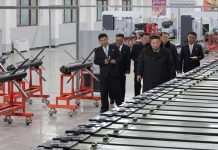DM Monitoring
LONDON: The recent disagreements on reaching a compromise to hold elections in Libya in December threatens the roadmap on the way to finally end a decade of chaos in the war-torn country, analysts said. Seventy-five delegates from the war-torn North African country aired their differences at rowdy meetings in Geneva last week.
But despite an extra day of unscheduled talks, they remain divided over when to hold elections, what elections to hold, and on what constitutional grounds – a blockage that threatens to hurl Libya back into crisis.
“No consensus was reached among the LPDF (Libyan Political Dialogue Forum) members” on the contentious question of a constitutional basis for the previously agreed December 24 polls, the U.N. acknowledged Saturday.
Oil-rich Libya was plunged into chaos after dictator Moammar Gadhafi was toppled and killed in a 2011 NATO-backed uprising.
Two rival administrations later emerged, backed by a complex patchwork of militias, mercenaries and foreign powers.
While Turkey supported the U.N.-recognized government in Tripoli, eastern-based putschist General Khalifa Haftar enjoyed backing from the UAE, Egypt and Russia.
Under a U.N.-backed cease-fire agreed last October, an interim administration was established in March to prepare for presidential and parliamentary polls on Dec. 24.
The U.N.’s Libya mission UNSMIL, in its statement Saturday, warned that “proposals that do not make the elections feasible” on that date “will not be entertained.”
Back into political crisis
But analysts said foreign parties were pushing Libya’s rival camps apart.
“The differences which emerged in Geneva were to be expected,” said Khaled al-Montasser, professor of international relations at the University of Tripoli.
He identified three tendencies. “A first group called for elections to be postponed to next year, a second only wants parliamentary elections and a third remains committed to the roadmap” which envisions both legislative and presidential polls.
The LPDF members were supposed to have agreed by July 1 on the constitutional basis for parliament to adopt an election law.




